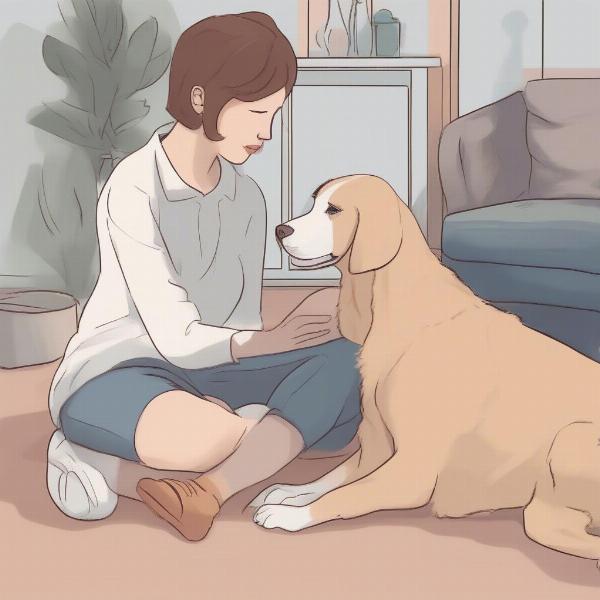Love sickness in dogs isn’t quite the same as the human experience, but it can manifest in noticeable behavioral changes. If your dog is acting differently, perhaps more clingy, anxious, or even off their food, they could be experiencing a form of emotional distress. This article will explore the concept of “love sick dog” and offer practical advice for concerned owners.
What Does “Love Sick” in Dogs Really Mean?
While dogs don’t experience romantic love in the same way humans do, they form strong attachments to their human families and other animal companions. Changes in these relationships, such as a new baby in the house, a house move, or the loss of a loved one (human or animal), can trigger stress and anxiety, sometimes misinterpreted as “love sickness”. It’s important to remember that your dog relies on routine and predictable environments, and disruptions can significantly impact their emotional well-being. Understanding their perspective is key to supporting them through these challenging times.
Signs Your Dog Might Be Experiencing Emotional Distress
Several behavioral changes might indicate your dog is struggling emotionally. These can include:
- Changes in appetite: Eating less or more than usual.
- Sleep disturbances: Difficulty sleeping, restlessness, or excessive sleeping.
- Increased vocalization: Whining, barking, or howling more than normal.
- Destructive behavior: Chewing on furniture, scratching at doors, or other destructive tendencies.
- Clinginess: Following you everywhere, needing constant reassurance.
- Withdrawal: Hiding, becoming less interactive, or showing disinterest in activities they usually enjoy.
- Changes in house-training habits: Accidents inside the house, even if previously house-trained.
Helping Your Love Sick Dog
If you notice these signs, there are several ways to help your furry friend cope:
- Maintain Routine: Sticking to a regular schedule for feeding, walks, and playtime can provide a sense of stability and security.
- Extra Attention and Affection: Spend quality time with your dog, offering comfort and reassurance through petting, gentle massage, and quiet conversation.
- Enrichment and Exercise: Provide plenty of opportunities for physical and mental stimulation. This can include walks, playtime, puzzle toys, and training sessions.
- Create a Safe Space: Ensure your dog has a comfortable and quiet den or bed where they can retreat when feeling overwhelmed.
- Pheromones and Calming Aids: Consider using pheromone diffusers or calming supplements, after consulting your veterinarian.
- Professional Help: If the behavior persists or worsens, consult with a veterinarian or a certified dog trainer or behaviorist. They can help identify the underlying cause of the distress and recommend appropriate interventions.
 Owner comforting dog
Owner comforting dog
When to Seek Professional Help
While some emotional distress is normal and manageable at home, some situations require professional intervention. If your dog’s behavior becomes extreme, self-destructive, or poses a danger to themselves or others, it’s crucial to seek help from a veterinarian or a certified dog behaviorist. They can diagnose any underlying medical conditions and develop a tailored behavior modification plan.
Conclusion
Understanding the root cause of your dog’s emotional distress is essential to providing effective support. While the term “love sick dog” is often used to describe these behaviors, it’s important to remember that dogs experience emotions differently than humans. By observing their behavior, providing a stable environment, offering extra love and attention, and seeking professional guidance when needed, you can help your furry friend navigate challenging times and maintain their emotional well-being.
FAQ
- Can dogs get depressed? Yes, dogs can experience depression, although it manifests differently than in humans.
- How can I tell if my dog is anxious? Signs of anxiety can include panting, pacing, excessive licking, destructive behavior, and changes in appetite and sleep patterns.
- Is it normal for my dog to be clingy after a move? Yes, it’s common for dogs to experience anxiety and clinginess after a move due to the disruption of their routine and familiar surroundings.
- What can I do if my dog is grieving the loss of another pet? Allow your dog to grieve in their own way, provide extra attention and comfort, and maintain a consistent routine.
- When should I consult a veterinarian about my dog’s emotional distress? If the behavior is severe, persistent, or worsening, it’s essential to consult with a veterinarian or a certified dog behaviorist.
- Are there medications that can help my dog with anxiety? Yes, your veterinarian can prescribe medications to help manage anxiety in dogs, but these should be used in conjunction with behavior modification techniques.
- How long does it take for a dog to adjust to a new baby in the house? The adjustment period varies depending on the dog’s personality and temperament, but it can take several weeks or even months.
ILM Dog is your trusted resource for expert advice on all aspects of dog care, from breed selection and puppy care to senior dog health and behavior. We offer a wealth of practical tips and information to help you provide the best possible care for your canine companion. If you need assistance with any aspect of dog ownership, don’t hesitate to reach out. Contact us at [email protected] or call us at +44 20-3965-8624. ILM Dog is dedicated to promoting responsible dog ownership and enhancing the bond between humans and their furry friends.